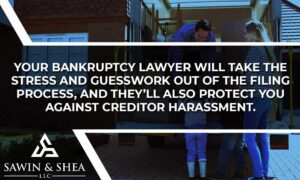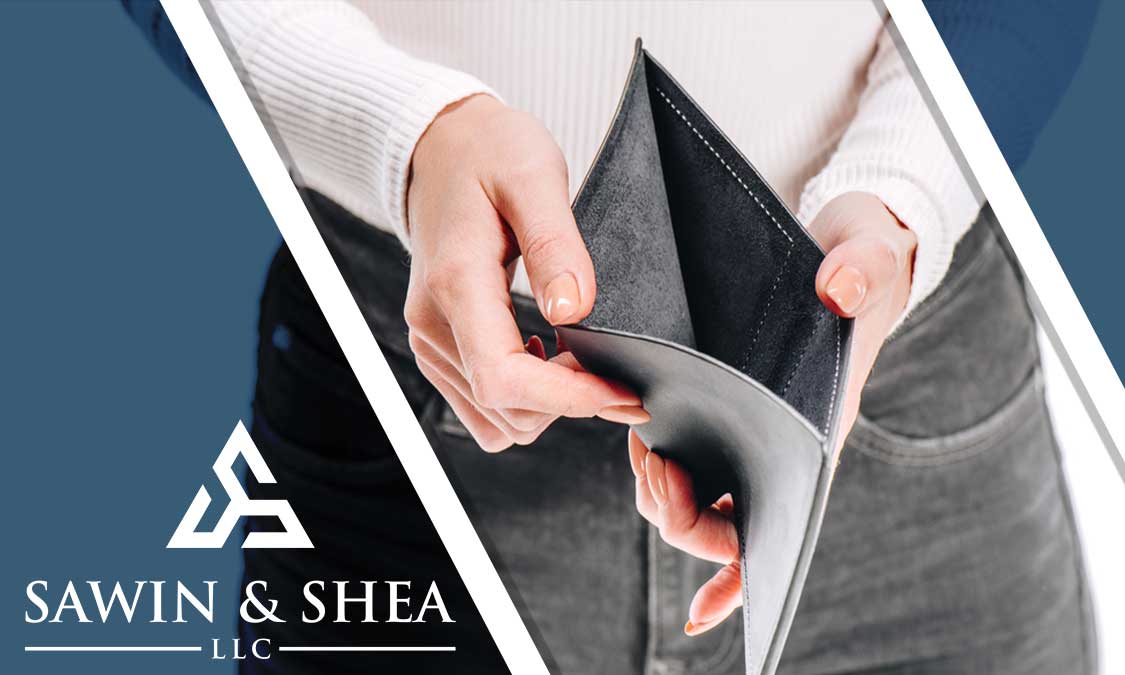If you’re considering filing for Chapter 7 or Chapter 13 bankruptcy, you need to know how much you should expect to pay for filing fees and other necessary expenses. You may also wonder whether you can file bankruptcy, no money down.
The short answer is “yes.” It is possible to file for bankruptcy with no money, but only in very limited circumstances. It is not generally recommended that Debtors take on the task of presenting a bankruptcy case pro se, that is without an attorney.
In this blog, we’ll discuss how to file bankruptcy with no money. We’ll also unpack paying bankruptcy fees in installments and why it’s best to enlist the experienced bankruptcy attorney. While you can technically file bankruptcy for free without a lawyer, it’s important to retain one if possible. Otherwise, you may make costly mistakes during the filing process that ultimately end up setting your finances back even further.
How Can I File Bankruptcy Chapter 7 With No Money?

While it’s possible to declare bankruptcy with no money down, you’ll need to file Chapter 7. You’ll also have to prove that you’re not financially able to pay for court fees and other expenses. To waive your fees, your household income must be below 150% of the federal poverty line. For instance, if two people live in your household and your household income is less than $1,822.50, you live below 150% of the poverty line. If you’re unsure whether you qualify based on your household income, consult this helpful chart.
If you meet this criterion, you’ll then submit Form 103B Application to Have the Chapter 7 Filing Fee Waived. The form will enable you to certify your income to prove that you cannot afford to pay filing fees.The ultimate decision on whether or not to waive the fee is up to the Judge that you are assigned. In the district where I practice, Judges are not going to waive the fee if you have paid an attorney any amount to help you with your case.
Additionally, you’ll need to ask for your required credit counseling and financial management class fees to be waived as well. These fees are typically less than $50 combined, but you can contact the agency or organization administering the counseling and financial management class if you can’t afford them.
Paying Bankruptcy Fees in Installments
If you’re unable to waive your Court fees, you’ll need to pay a total of $338 for a Chapter 7. This total includes the filing fee, administrative fee, and trustee surcharge, but it does not include your credit counseling and financial management class fees.
Those unable to afford this fee upfront can apply to pay in installments. You’ll need to fill out Form 103A Application for Individuals to Pay the Filing Fee in Installments. You’ll submit this form along with your bankruptcy petition and your payment plan’s first installment. This first payment is usually around $80, and you’ll make three subsequent payments to cover the $338 in fees.
Fortunately, filing for bankruptcy places an automatic stay on your assets. With this automatic stay, your creditors won’t be able to garnish your wages, meaning that you can use your earnings to pay your installment plan. However, if you do not make timely installment payments, the Court will dismiss your case and you will once again be at the mercy of your creditors.
Should I File for Bankruptcy for Free?

If you’re hoping to avoid paying any money when you file for bankruptcy, you’ll likely want to file a Pro Se bankruptcy, meaning you file without the assistance of an attorney. This is fairly common for those hoping to save money during the filing process. However, filing Pro Se bankruptcy carries certain risks and will make the process far more challenging.
The main reason why you’ll want to hire a bankruptcy attorney is for their knowledge and experience.
When filing bankruptcy, you’ll need to know:
- What debts are dischargeable
- What assets are exempt and not exempt
- Court rules and procedures
Due to the nuances and complexities of filing bankruptcy, it’s not surprising that Pro Se bankruptcies have a much higher likelihood of failure than bankruptcies assisted by attorneys. The truth is that while you may save money by opting for a Pro Se bankruptcy, you may end up having to pay more in the long run because of mistakes. You might not be able to retain certain exempt assets, or you may fail to discharge your eligible debts.

Further, the more complex your bankruptcy filing, the more critical it is for you to invest in a bankruptcy attorney. For instance, Chapter 13 is more complicated than Chapter 7 and requires filers to create a repayment plan to pay back creditors. An experienced Chapter 13 bankruptcy attorney can help you navigate this confusing process to ensure you file correctly and with the best payment plan possible.
Your bankruptcy lawyer will take the stress and guesswork out of the filing process, and they’ll also protect you against creditor harassment. As we’ve discussed, filing for bankruptcy places an automatic stay on your assets, meaning your creditors cannot attempt to recover what you owe, repossess your property, or garnish your wages. That said, it’s common for unethical creditors to unlawfully harass debtors after they’ve already filed for bankruptcy. Fortunately, you can rest assured that an experienced bankruptcy attorney will protect your rights against aggressive creditors.
Contact a Bankruptcy Attorney Today
While you have every right to file for bankruptcy alone, consider contacting an attorney. An attorney’s guidance will help you file correctly while retaining the most assets possible.
Here at Sawin & Shea, LLC, our Chapter 13 and Chapter 7 bankruptcy attorneys have years of experience assisting those filing for bankruptcy in Indiana, and we’ve helped numerous individuals recover money from abusive creditors.
You can schedule a free consultation with our attorneys today by calling 317-759-1483 or by filling out this form.



